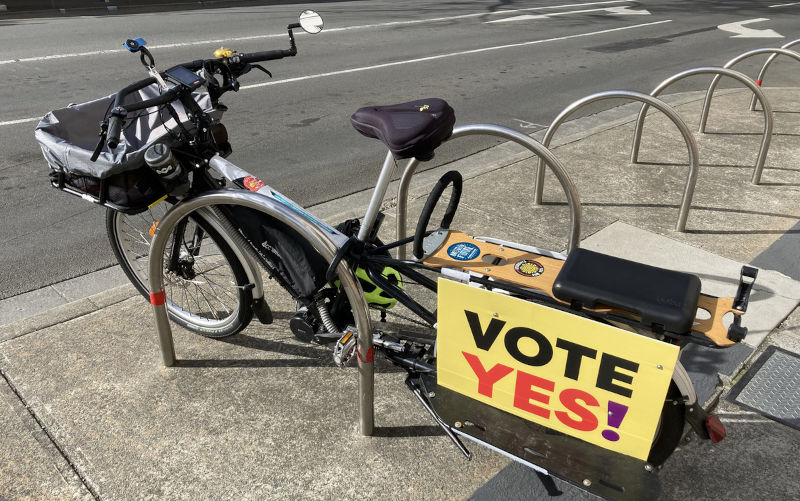This land cries out in final warning
October 3, 2023
We need an Indigenous Voice to parliament. We need any other voice that will offset the disastrous self-serving notions of the present fools that govern this country. We are all living under the shadows of the illusions of the colonised mind.
There are many discussions bubbling along under the surface of Australian society today: the UN’s final warning to act on climate change, issues of representation and the sovereignty of First Nations People, lack of social housing, failures in aged care, robodebt, offshore detention… But there are commonalities to these problems; they are created by sneaky, pathetic governance. How can we connect through the intersectionality of our suffering and work together to promote genuine change?
In a Twitter post from Invasion Day, Senator Lydia Thorpe talks about the ‘free and happy, sustainable life’ of First Nations People before colonisation. She says that 2023 is a time to ‘fix some of those wrongdoings’ and start ‘making amends with the land and the water and the sky and the people.’
The IPCC recently released a report on climate change, a ‘ final warning’ calling for drastic action. Yet Australia has 116 new fossil fuel projects in the pipeline. The government’s only answer to this problem is the Safeguard Mechanism, a ‘pay to pollute model’ in which ‘the costs are pocket change’ for the ‘hugely profitable multinational companies concerned’. Whose voice can speak with authority to demand change?
Indigenous activist Gary Foley sees the referendum as a dangerous distraction, but he states that a No vote would ‘ set us back another 50 years’. He explains that real change was able to be made with the Pan Aboriginal movement of the 1970s because it was about ‘self-determination, something that you create for yourself and take’ and that’s why it was ‘so strong’. ‘Governments didn’t back off because they thought it was the right thing to do, they backed off because we forced them to’.
Foley’s sentiments echo Audrey Lorde, the Black activist who famously said ‘the master’s tools will never dismantle the master’s house’. The problem is not only the house, but the stolen land it’s on. 56% of Australian household wealth is in housing, many of us are profiting from the $9.6 trillion rise in the residential market at the end of May 2023, ignoring the origins of this hush money as it trickles up to maintain the status quo, a cunning continuation of colonialism. But we have little choice, if we don’t invest in our futures, we will be forced into homelessness, as the recent housing crisis has shown.
Indigenous philosopher and Yankunytjatjara Elder Uncle Bob Randall explains that the land ‘ is the ancient one, we are the children who come and go…’. Uncle Randall raises the issue of incongruity with the British system, trying to challenge land rights with the notion of ‘the land owns us’, saying that ‘the British system couldn’t take it in’, they had ‘no way of understanding what we were saying’. Our systems of governance are mired in imperialist ideologies of dominance. Uncle Randall laughs as he says, ‘applying the oneness for that little quarter acre block in the suburbs, look how little you’ve shrunk, from that Oursness which is stretched from horizon to horizon’. Indigenous voices provide us with sustainable, alternative ways to think and be.
Senator Jacinta Nampijinpa recently asserted, ‘ if you constitutionally enshrine [the Voice], that’s suggesting that the gap will exist in perpetuity’, referring to the gap between Indigenous and non-Indigenous Australians. This notion fails to understand that a Voice is a voice, an opinion coming from a body with ideas that are distinct from those of other bodies. The Voice will not enshrine a gap of disadvantage; suggesting this betrays Nampijinpa’s view of Indigenous perspectives as inherently deprived. An Indigenous Voice to parliament will allow all of us to hear brilliant and important ways of thinking that we all have need of.
What is the role of the words of a white woman in this debate? A woman who will not palm off the healing work and the processing to Indigenous people alone. A woman who says, we need to work together.
This is the age of intersectionality. Makarrata is the coming together after a struggle.
Let’s come together. Let’s vote yes. Let’s vote yes, and.
Let’s find the power of a ‘yes’ that means change, when ‘no’ means everything stays the same. Let’s vote yes, and empower self-determination.
We need an Indigenous Voice to parliament. We need any other voice that will offset the disastrous self-serving notions of the present fools that govern this country. We are all living under the shadows of the illusions of the colonised mind. We are not free unless we’re all free.
From Wurundjeri Country, this land was never ceded. This land cries out in final warning.
This land is asking for change.
